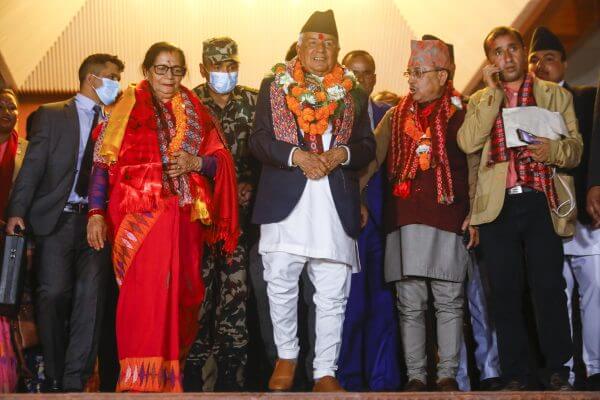Ram Chandra Paudel secured the support of Nepali Parliament to become the country’s president on Thursday.
Paudel secured 33,802 votes, whereas, the rival candidate, Subash Chandra Nembang, received 15,518 votes.
Paudel will replace Bidya Devi Bhandari, whose tenure is scheduled to end on 12 March.
हार्दिक आभार ! pic.twitter.com/NxeZvpPIeD
— Ram Chandra Paudel (@NcPaudel) March 9, 2023
Paudel’s History in Nepalese Politics
Paudel was previously the Speaker of the parliament, and has also been appointed to the parliament as a legislator six times. In addition, he has been appointed to ministerial positions on five occasions, including as the interior minister.
He also played a critical role in bringing down the former monarchy rule, for which he spent time in prison.
Controversial Appointment
I met Ram Chandra Paudel once, during my time as EIC for Kathmandu Post. He spent a good 10 minutes talking about what Switzerland was like, even in the most remote towns and villages, and why we couldn't do that in Nepal.
— Anup Kaphle (@AnupKaphle) March 9, 2023
Can't wait, Mr. President.https://t.co/UqQr2MBbTZ
An electoral college comprising the two houses of the parliament and the seven provincial assemblies appoints the president. While the position is largely ceremonial, the president plays a critical role in forming the government during political crises.
Paudel’s appointment comes against the backdrop of weeks of political instability in Nepal, with internal feuds between the ruling coalition.
Prime Minister Pushpa Kamal Dahal’s decision to support opposition Nepali Congress leader Paudel’s candidature irked his coalition partner, the Communist Party of Nepal (Unified Marxist Leninist), which had advocated for its own candidate for the post.
Dahal’s motivation to pick an opposition leader over his coalition partner’s candidate is unclear.
UK Minister of State in the FCDO Rt.Hon Ms. Anne-Marie Trevelyan called on Rt. Hon. Prime Minister Pushpa Kamal Dahal ‘Prachanda’ today. Matters of Nepal-UK relations were discussed during the call on. pic.twitter.com/tBPJxfroiB
— PMO Nepal (@PM_nepal_) March 10, 2023
The differences resulted in the CPN-UML leaving the ruling coalition. Dahal’s Community Party of Nepal (Maoist Centre) has now formed an alliance with the Nepali Congress.
Given that the Nepali Congress has had historical ties with India, as compared to the pro-China CPN-UML, the change in the ruling coalition is likely a positive sign for New Delhi.
Political Instability
This political instability will likely hinder the incumbent government, particularly given the controversy surrounding the president’s appointment.
The UK is one of Nepal’s oldest friends. A privilege to meet #Nepal’s Prime Minister @cmprachanda today to discuss our partnership & shared interests, including green investment, Nepal’s constitution & support for our Gurkha veterans #UKNepal100 @UKinNepal @MarkLancasterMK pic.twitter.com/T1GnPwJjTc
— Anne-Marie Trevelyan (@annietrev) March 10, 2023
Dahal is also facing a vote of confidence later in March. The drop in foreign tourists due to the COVID-19 pandemic impacted the country’s economy, further straining the country’s governance.
Dahal will also have to defend himself before the Supreme Court in a petition that demands his arrest over crimes committed during the civil war between the Maoists and the incumbent monarchy. It ended after the two sides signed a peace agreement in 2006.
Nepal’s politics has had a history of infighting, often resulting in coalitions breaking and governments changing. In the ten years since the institution of the country’s constitution, Kathmandu has seen eight different governments.

